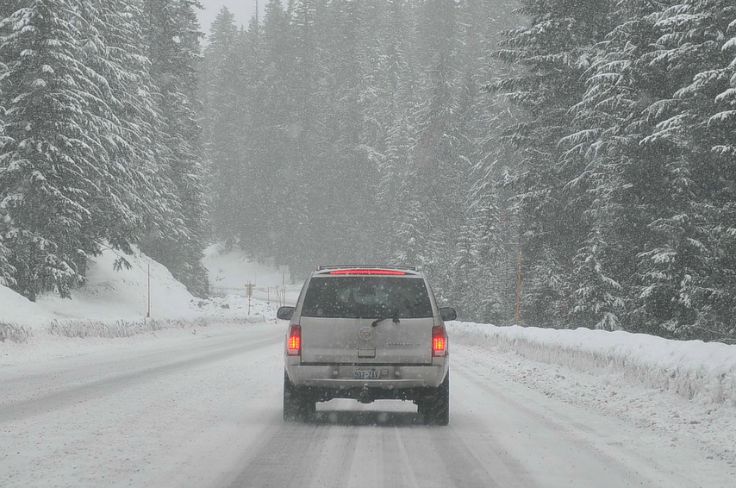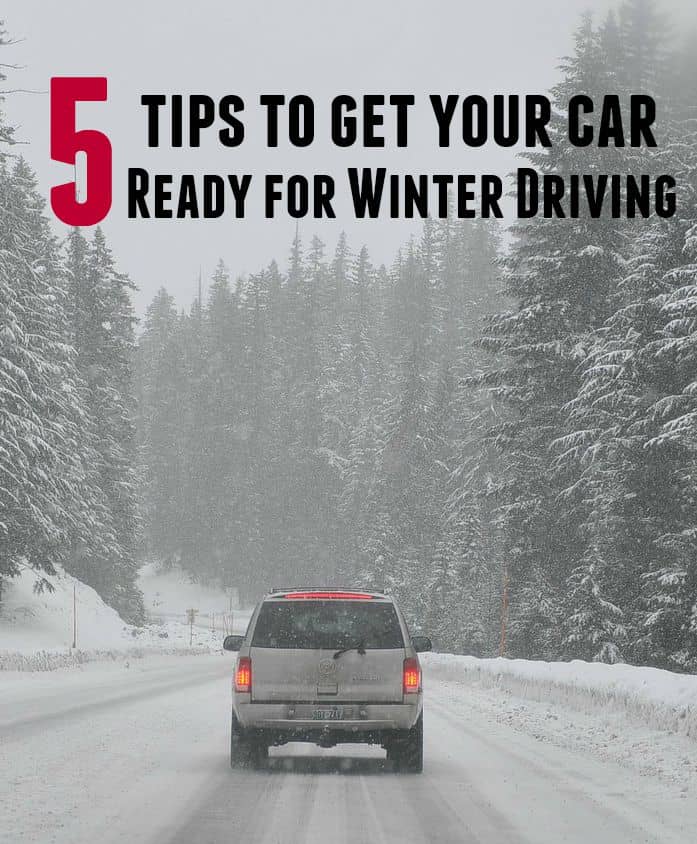Last Updated on August 14, 2020 by Ellen Christian
Winter has already arrived here in Vermont, and if it hasn’t yet in your area, it will be coming soon. Winter driving is not my favorite thing in the world, so I try hard to find tips for getting your car ready for winter. We live fairly far out from town, so I want to make sure that my care is in the best condition possible for winter. Here are a few tips for getting your car ready for winter that I hope will make winter driving easier for you. This post has been sponsored.
Posts may be sponsored. This post contains affiliate links, which means I will make a commission at no extra cost to you should you click through and make a purchase. As an Amazon Associate I earn from qualifying purchases.
Tips for getting your car ready for winter
1. Wash and wax your car at a professional car wash – It may seem counterintuitive to get your car nice and shiny for what’s often the sloppiest season, but a thorough wash can remove harmful compounds that may cause damage when mixed with sand and road salt. Experts from the International Carwash Association also recommend a coat of wax for an extra layer of protection from the elements.
Professional car washes can also save up to 20 percent of the amount of water you’d use by washing your car at home. They do this by treating and reusing their water, rather than releasing toxic chemicals and grime into the storm drains, which can often occur with pavement washing. Check out www.washwithwatersavers.com to see how professional car washes save water and help prevent pollution.
2. Check fluids – Check your coolant to make sure you have enough, as you’ll be left without heat if you don’t. Consult your owner’s manual to find the correct blend if you need to add more. It’s never a bad idea to keep extra coolant in your trunk in case of an emergency. Don’t forget about extra wiper fluid, either. It’s not expensive, so stock up! Trust me, after breaking down on the side of the road a few weeks ago & losing coolant. I have extra now.
3. Winter emergency kit – In addition to stocking your car with a scraper and brush, it’s a good idea to include a few provisions in case you get stranded in snowy and cold conditions. Pack extra blankets, hats and gloves, high-energy snacks like granola bars, drinking water and a first-aid kit.
4. Test your battery – The next time you have the car in for an oil change, ask the mechanic to check your battery to make sure it can provide enough starting power once the temperature plummets.
5. Check your wipers – When sloppy weather hits, you’ll want to make sure you have strong wiper blades to see through the elements. Checking your wiper blades for wear and replacing them if needed can prevent huge visibility headaches once snow and sleet arrive.
Before the bad weather arrives, make sure that you follow these tips for getting your car ready for winter. Don’t wait until the snow falls before you prepare.

Ellen is a busy mom of a 24-year-old son and 29-year-old daughter. She owns six blogs and is addicted to social media. She believes that it doesn’t have to be difficult to lead a healthy life. She shares simple healthy living tips to show busy women how to lead fulfilling lives. If you’d like to work together, email info@confessionsofanover-workedmom.com to chat.



I learned that keeping your car clean Improves fuel economy. That’s always a plus.
i learned that
WaterSavers® car washes use an average of no more than 40 gallons (151.5 liters) of fresh water per car. All of that water is either recycled or returned to the environment cleanly.
Each participating car wash must annually reaffirm that it is meeting the above criteria, including inspection by a licensed plumber or distributor member.
WaterSavers® car washes prevent water pollution by routing wash water to treatment prior to its return to the environment.
I learned that A study by the City of Federal Way (Washington) found that residential car washing led to the following being released into their storm sewer system:
190 gallons (719 liters) of gasoline, diesel and motor oil
400 pounds of phosphorus and nitrogen
60 pounds of ammonia
2,200 pounds of surfactants
3,000 pounds of solids
jofo120 at yahoo dot com
The cleaner your car, the less wind resistance. Which means better fuel usage.
http://washwithwatersavers.com/take-action/charity-car-washing
I learned that using a garden hose at home to wash your car, you can use more than 60 gallons (227.1 liters) in as little as five minutes.
Looks super cool! Thanks for the opportunity..
That it takes 40 gallons to wash a car
I learned that there are no watersavers car washes near me, at least not within 20 miles.
I learned that water entering storm drains, unlike water that enters sanitary sewers, does not undergo treatment before it is discharged
They use no more than 40 gallons of water per car.
I did not know a clean car actually used less fuel!
would love to win
I didn’t know that a WaterSaver car wash only uses about the same amount of water as a load of laundry
Learned that when cars are washed on streets, parking lots and driveways, that dirty water eventually winds up in rivers, streams and lakes… not good!
I learned Washing regularly keeps windshields, mirrors and signal lights clean. You will see more of the road, and others will be better able to see you.
diane(dot)wortman(at)gmail(dot)com
When you wash your car on pavement, the run-off carries the grime and chemicals into the soil and storm drains that empty directly into our rivers.
I’ve learned that “WaterSavers® car washes prevent water pollution by routing wash water to treatment prior to its return to the environment”
Thank You
learned that their washing mechanism uses less water per car than most washing machine do for a load.
I learned that car wash runoff is a significant cause of water pollution.
the cleaner your car, the less wind resistance
I would like to win.
I learned that there is a WaterSavers car wash near me , 2.27
miles away,
Downtown Car Wash.
Did you know that the cleaner your car, the less wind resistance? That means better fuel economy.
I learned that all of their spray nozzles are inspected annually to ensure maximum efficiency of water used.
It’s cool that they are so responsible!
40 gallons (151.5 liters) of fresh water per car
I learned that a professional car wash uses less water
I learned that when my car is clean, their is less wind resistance…meaning better gas mileage. What a great tip for saving money. 🙂 Thank you.
use on average of 40 gallons of water just washing our car!
imnotarunner@gmail.com
I learned that a professional car wash uses less water & recycles the water.
I am in.
There are 6 water saving car washes within 15 miles of my house. One is my hubby’s favorite self serve car wash. That makes me happy!
Washing my car in the driveway can lead to run off getting into our waterways!
By reducing water pollution in our communities, we are protecting our streams, rivers and water tables.
I learned by washing your car you can get better gas mileage.
Professional car washes typically use 40 gallons of water and recycle most or all of the water while at home washes waste approx 60 gallons
Keep your car clean
. The WaterSavers® program also aims to inform consumers that professional car washes are safer for the environment than washing a car at home and on pavement.
WaterSavers® car washes prevent water pollution by routing wash water to treatment prior to its return to the environment. These car washes also use only 40 gallons (151.5 liters) or less of fresh water per car wash – less than the typical home washing machine.
the cleaner your car, the less wind resistance
car washes use an average of 40 gallons of water
I honestly never thought that washing my car at home was that bad…but seeing it from this perspective…UGH. Because of the drought, we didn’t wash cars at home at all this year…but this is really good to keep in mind for the future…
I learned that the cleaner your car, the less wind resistance, which means better fuel economy.
I didn’t know: Did you know that the cleaner your car, the less wind resistance? That means better fuel economy.
I was surprised at the amount of water generally used to wash our cars. Geez. . . .
I learned that the water savers car washes use less water than most washing machines.
I learned that a professional car wash uses less water and recycles the water.
i learned professional car washes are the better environmental choice,
40 gallons of water to wash your car? wow did not know that
I learned that they use 40 gallons per car wash!
Watersavers is an international organization
cleaner your car, the less wind resistance, which means better fuel economy
To earn the WaterSavers® designation, a car wash must:
Water Quality Criteria
Route all water discharge to a treatment facility or leech/septic field.
Have a backflow prevention device installed and operable on the potable water supply
pollution from washing off your car can end up in drinking water
I learned that when you wash your car on pavement, the run-off carries the grime and chemicals into the soil and storm drains that empty directly into our rivers
The water used in their car wash uses less water than one load in your washing machine.
I learned the nearest site to me is in the next state. Well maybe when we visit we can go there. Sounds interesting. My daughter would love it as she enjoys car washes.
When I wash my car on pavement, the residue can find its way into our rivers.
water saver car washers only use 40 gallons of water so it is very water efficient.
It is better for the environment to go thru a car wash.
i learned washing your car on pavement pollutes!
I learned and like that they do charity car washes!
I learned that they use an average of 40 gallons of water to wash a car.
When I use their car wash, not only do I SAVE myself hassle- but it is MUCH better for the environment for me to do it!!!! Instead of the run off going to the storm drains!
the cleaner your car, the less wind resistance, which means better fuel economy
We use on average of 40 gallons of water just washing our car!
car washes use an average of 40 gallons of water and washing machines 41 gallons
I had no idea that the run off from washing the car hitting the pavement leaves behind chemicals…. Didn’t even pause to think what it does.
We use on average of 40 gallons of water just washing our car! wow
I forgot that you should check your wiper blades every so often. This year we have been in a drought and I have barely used mine, but I do think I need to get new ones and this is a great reminder
This look like an awesome kit
would like to win
confessions of an of an over workedmom